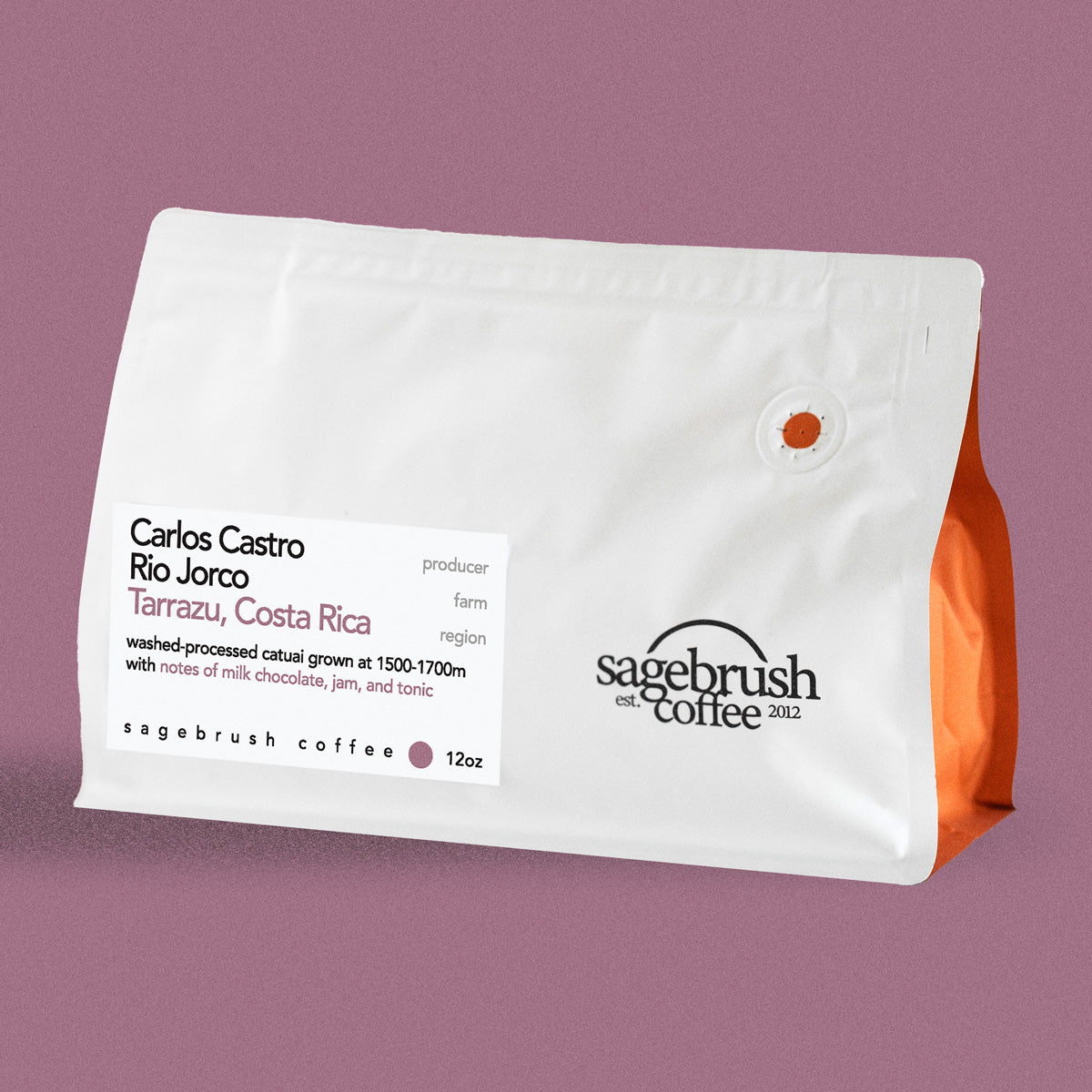Producer Profiles Main Page •
Back to Producers OverviewMeet Carlos Castro: Coffee Producer at Rio Jorco Mill, Costa Rica
When we think about the people behind our coffee partnerships, Carlos Castro and his team at Rio Jorco Mill hold a special place in our hearts. There's something deeply moving about watching a family pour their resources and energy into reviving not just a coffee mill, but an entire community's livelihood in the mountains of Tarrazú, Costa Rica.
Eden and I first visited Rio Jorco back in 2023, when we were building our partnership with Perry Czopp and Selva Coffee. Walking through those pristine facilities and meeting the team, we could feel the care that goes into every decision they make. This wasn't just about processing coffee, it was about rebuilding something meaningful for everyone involved.
A Story of Revival
Rio Jorco Mill has one of those stories that sticks with you.
For decades, this mill was a cornerstone of coffee production in Tarrazú, processing some of the most consistent and representative coffees from the region. The facility had built a strong reputation over many years, becoming a standard-bearer for local coffee production. But like many agricultural operations, poor financial decisions by previous management led the mill into serious trouble. Things got so difficult that the property had to be sold.
That's when Carlos Castro stepped in. A farmer and philanthropist with deep roots in the community, Carlos saw an opportunity not just to acquire a business, but to support the dozens of farming families who depended on the mill for their livelihoods. Since Carlos and his family took over, Rio Jorco has truly flourished. The health of the plantations has improved dramatically, the mill operations run more smoothly than ever, and most importantly, the surrounding community has found renewed stability and hope.
Family at the Heart
What makes Rio Jorco special is how it operates as a true family endeavor. Carlos works closely with his daughter, her husband Yendry, and their trusted colleague Gerardo. Each brings their own strengths to the operation. Together, they've not only turned Rio Jorco around but have actually elevated its reputation beyond what it had achieved before.
The team manages relationships with about 25 farms in the surrounding area, in addition to running their own farm called Los Lobos, which sits at the highest elevation of all the farms they work with. This collaborative approach means they're not just running a mill, they're nurturing an entire network of coffee producers, each with their own story and contribution to the final cup.
Traditional Excellence in Processing
Rio Jorco is known throughout Tarrazú for their traditional semi-washed processing method, which they've been perfecting for years. It starts with well-trained workers who know exactly when to harvest cherries at their optimal ripeness. Once the coffee arrives at the mill, measured and paid for at fair prices, the real craftsmanship begins.
The cherries undergo a slight fermentation overnight before being depulped the next morning. The beans then move to large fermentation tanks where they ferment dry during the day, then under fresh water overnight. The next day, workers vigorously agitate the parchment coffee in water to remove as much mucilage as possible before a final rinse ensures the beans are completely clean.
From there, the coffee moves to sun-drying patios where it's spread in medium-thickness layers and turned every couple of hours. When it reaches the right moisture level, the beans transfer to mechanical dryers called guardiolas for precise final drying. Rio Jorco also maintains their own dry mill equipment to prepare coffee for export, controlling quality at every step of the journey.
Building Community Through Coffee
What really sets Carlos and his team apart is their commitment to the broader community. Rio Jorco pays what they call fair share prices to their producer partners, which helps maintain economic sustainability throughout the coffee growing region and encourages continuous quality improvement. Daily Coffee News This isn't just business for them, it's about ensuring that coffee farming remains viable for generations to come.
The mill employs between four and six people year-round, expanding to about 65 workers during harvest season. Each of these jobs represents a family supported, a community strengthened. The Castro family understands that their success is intertwined with the success of every farmer who brings coffee to their mill.
Sustainability in Practice
Environmental stewardship runs deep at Rio Jorco. The mucilage from processed cherries gets composted into fertilizer Evansbrotherscoffee, giving nutrients back to the soil. Water conservation measures ensure this precious resource is used responsibly, with some water being recycled through the processing system and residual water being properly treated before returning to the ground.
The property itself reflects this commitment to conservation. Much of the land remains in its natural state, preserving the ecosystem that makes this region so special for coffee cultivation. At elevations between 1,270 and 1,650 meters, the farms benefit from the unique microclimate created by Pacific winds sweeping through the valley, contributing to the slow maturation and sugar development that Tarrazú coffees are known for.
Why This Partnership Matters
Working with Carlos Castro and Rio Jorco feels like being part of something bigger than just buying and selling coffee. It's about supporting a vision where quality coffee production goes hand in hand with community wellbeing and environmental responsibility. Every time we cup their coffees, we're reminded of the meticulous care that goes into each batch, from the farmers who carefully select ripe cherries to Gerardo overseeing the drying patios, to Yendry ensuring everything runs smoothly at the mill.
The transformation Carlos and his family have brought to Rio Jorco proves that with the right intentions and dedication, a struggling operation can become a beacon of hope for an entire region. They've shown that success in coffee isn't just measured in cup scores or export volumes, but in the stability and prosperity of the community that makes it all possible.
Explore Coffees
Carlos Castro • Washed-Processed Catuai





